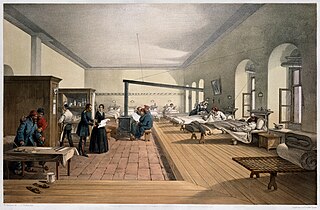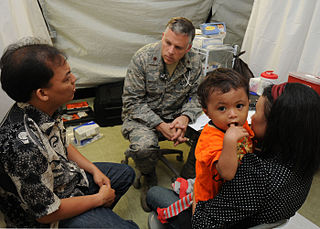
Health informatics is the study and implementation of computer structures and algorithms to improve communication, understanding, and management of medical information. It can be viewed as branch of engineering and applied science.
A dietitian, medical dietitian, or dietician is an expert in identifying and treating disease-related malnutrition and in conducting medical nutrition therapy, for example designing an enteral tube feeding regimen or mitigating the effects of cancer cachexia. Many dietitians work in hospitals and usually see specific patients where a nutritional assessment and intervention has been requested by a doctor or nurse, for example if a patient has lost their ability to swallow or requires artificial nutrition due to intestinal failure. Dietitians are regulated healthcare professionals licensed to assess, diagnose, and treat such problems. In the United Kingdom, dietitian is a 'protected title', meaning identifying yourself as a dietitian without appropriate education and registration is prohibited by law.

The Medical Library Association (MLA) is a nonprofit educational organization with more than 3,400 health-sciences information professional members.
The National Association for the Education of Young Children (NAEYC) is a large nonprofit association in the United States representing early childhood education teachers, para-educators, center directors, trainers, college educators, families of young children, policy makers, and advocates. NAEYC is focused on improving the well-being of young children, with particular emphasis on the quality of educational and developmental services for children from birth through age 8.

The American Osteopathic Association (AOA) is the representative member organization for the more than 176,000 osteopathic medical doctors (D.O.s) and osteopathic medical students in the United States. The AOA is headquartered in Chicago, Illinois, and is involved in post-graduate training for osteopathic physicians. Beginning in 2015, it began accrediting post-graduate education as a committee within the Accreditation Council for Graduate Medical Education, creating a unified accreditation system for all DOs and MDs in the United States. The organization promotes public health, encourages academic scientific research, serves as the primary certifying body for D.O.s overseeing 18 certifying boards, and is the accrediting agency for osteopathic medical schools through its Commission on Osteopathic College Accreditation. As of October 2015, the AOA no longer owns the Healthcare Facilities Accreditation Program (HFAP), which accredited hospitals and other health care facilities.
Community organization or community based organization refers to organization aimed at making desired improvements to a community's social health, well-being, and overall functioning. Community organization occurs in geographically, psychosocially, culturally, spiritually, and digitally bounded communities.
Faith Community Nursing, also known as Parish Nursing, Parrish Nursing, Congregational Nursing or Church Nursing, is a movement of over 15,000 registered nurses, primarily in the United States. There are also Parish nurses in Australia, the Bahamas, Canada, England, Ghana, India, Kenya, Korea, Madagascar, Malawi, Malaysia, New Zealand, Nigeria, Palestine, Pakistan, Scotland, Singapore, South Africa, Swaziland, Ukraine, Wales, Zambia and Zimbabwe. Faith community nursing is a practice specialty that focuses on the intentional care of the spirit, promotion of an integrative model of health and prevention and minimization of illness within the context of a community of faith. The intentional integration of the practice of faith with the practice of nursing so that people can achieve wholeness in, with, and through the population which faith community nurses serve.
Health advocacy or health activism encompasses direct service to the individual or family as well as activities that promote health and access to health care in communities and the larger public. Advocates support and promote the rights of the patient in the health care arena, help build capacity to improve community health and enhance health policy initiatives focused on available, safe and quality care. Health advocates are best suited to address the challenge of patient-centered care in our complex healthcare system. The Institute of Medicine (IOM) defines patient-centered care as: Health care that establishes a partnership among practitioners, patients, and their families to ensure that decisions respect patients’ wants, needs, and preferences and that patients have the education and support they need to make decisions and participate in their own care. Patient-centered care is also one of the overreaching goals of health advocacy, in addition to safer medical systems, and greater patient involvement in healthcare delivery and design.
Patient advocacy is a process in health care concerned with advocacy for patients, survivors, and caregivers. The patient advocate may be an individual or an organization, concerned with healthcare standards or with one specific group of disorders. The terms patient advocate and patient advocacy can refer both to individual advocates providing services that organizations also provide, and to organizations whose functions extend to individual patients. Some patient advocates are independent and some work for the organizations that are directly responsible for the patient's care.

In medicine, rural health or rural medicine is the interdisciplinary study of health and health care delivery in rural environments. The concept of rural health incorporates many fields, including wilderness medicine, geography, midwifery, nursing, sociology, economics, and telehealth or telemedicine.

Health administration, healthcare administration, healthcare management or hospital management is the field relating to leadership, management, and administration of public health systems, health care systems, hospitals, and hospital networks in all the primary, secondary, and tertiary sectors.

Healthcare in Senegal is a center topic of discourse in understanding the well-being and vitality of the Senegalese people. As of 2008, there was a need to improve Senegal's infrastructure to promote a healthy, decent living environment for the Senegalese.

A rural health clinic (RHC) is a clinic located in a rural, medically under-served area in the United States that has a separate reimbursement structure from the standard medical office under the Medicare and Medicaid programs. RHCs were established by the Rural Health Clinic Services Act of 1977, . The RHC program increases access to health care in rural areas by
- creating special reimbursement mechanisms that allow clinicians to practice in rural, under-served areas
- increasing utilization of physician assistants (PA) and nurse practitioners (NP)

The Society of Hospital Medicine (SHM) is a membership society for hospitalists, physicians, and other caregivers who practice the specialty of hospital medicine.
The Registered Nurses’ Association of Ontario (RNAO) is the professional association representing registered nurses, nurse practitioners and nursing students in the province of Ontario, Canada. RNAO provides a strong and credible voice for the nursing profession to influence and promote healthy public policy.
The National Rural Health Alliance (NRHA) is Australia's peak non-government organisation for rural and remote health.
The Area Health Education Centers (AHEC) Program is a federally funded program established in the United States in 1972 "to improve the supply, distribution, retention and quality of primary care and other health practitioners in medically underserved areas." The program is "part of a national effort to improve access to health services through changes in the education and training of health professionals." The program particularly focuses on primary care.
The American Hospital Association's Center for Healthcare Governance (The center) is a membership based organization that is affiliated with the AHA. Founded in 2004 and based in Chicago, Illinois, Center members include more than 500 hospital and health system boards and other organizations that serve the health care sector. The center also provides governance resources and services to the more than 5,000 member organizations of the American Hospital Association. The Mission of the center is to bring about excellence and accountability in governance by being the valued source, for health care leaders and trustees, of innovative governance thinking, information, tools and content. The center is governed by a board of managers and also receives guidance on program and service development from a national board of advisors.
AcademyHealth is a nonpartisan, nonprofit professional organization dedicated to advancing the fields of health services research and health policy. It is a professional organization for health services researchers, health policy analysts, and health practitioners, and it is a nonpartisan source for health research and policy. The organization was founded in 2000, in a merger between the Alpha Center and the Association for Health Services Research (AHSR). In 2008, the organization had approximately 4000 health services researcher members.

Cultural competence in healthcare refers to the ability for healthcare professionals to demonstrate cultural competence toward patients with diverse values, beliefs, and feelings. This process includes consideration of the individual social, cultural, and psychological needs of patients for effective cross-cultural communication with their health care providers. The goal of cultural competence in health care is to reduce health disparities and to provide optimal care to patients regardless of their race, gender, ethnic background, native languages spoken, and religious or cultural beliefs. Cultural competency training is important in health care fields where human interaction is common, including medicine, nursing, allied health, mental health, social work, pharmacy, oral health, and public health fields.









